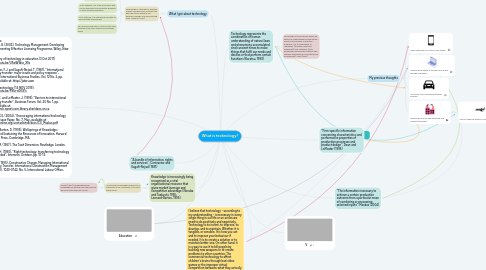What is technology?
by Firas Taha


1. What I got about technology
1.1. Technology is a wonderful, amazing, always-changing bags of tricks that help the human being to live healthier, happier and more fulfilling lives. Megantz (2002)
1.1.1. To a scientist, technology is the end product of one's research.
1.1.2. To an engineer, it is a tool or process that can be employed to build better products or solve technical problems.
1.1.3. To an attorney, it is intellectual property to be protected and guarded.
1.1.4. To a business executive, it may be the most important, yet least understood company asset.
2. References: - Megantz, B. (2002), Technology Management: Developing and Implementing Effective Licensing Programme, Wiley, New York, NY. -The history of technology in education (3 Oct 2011) https://youtu.be/UFwWWsz_X9s -Contractor, F.J. and Sagafi-Nejad, T. (1981), “International technology transfer: major issues and policy response”, Journal of International Business Studies, Vol. 12 No. 2, pp. 113-35, available at: http://jstor.com -What is Technology (14 NOV 2019). https://youtu.be/Px5z-dG531c -Dean, C.C. and LeMaster, J. (1995), “Barriers to international technology transfer”, Business Forum, Vol. 20 No. 1, pp. 19-23, available at: http://search.epnet.com.library.sheridanc.on.ca -Maskus, K.E. (2004), “Encouraging international technology transfer”, Issue Paper, No. 7, May, available at: www.iprsonline.org/unctadictsd/docs/CS_Maskus.pdf -Leonard-Barton, D. (1995), Wellsprings of Knowledge: Building and Sustaining the Resources of Innovation, Harvard University Press, Cambridge, MA. -Polanyi, M. (1967), The Tacit Dimension, Routledge, London. -Karatsu, H. (1990), “Right technology: transferring technology that is needed”, Intersect, October, pp. 10-13. -Miles, D. (1995), Constructive Change, Managing International Technology Transfer, International Construction Management Series (ILO). 1020-0142, No. 5, International Labour Office, Geneva.
3. “A bundle of information, rights and services”. Contractor and Sagafi-Nejad (1981)
4. I believe that technology - according to my understanding - is necessary in every single thing in our life or an action we need to do positively and negatively. Technology is to invent, to improve, to develop, and to maintain. Whether it is tangible, or sensible. It is how you act and to improve your behaviour if needed. It is to create a solution or to maintain better one. On other hand, it is a way to use it to kill people by building new weapons or to create problems to other countries. The commercial technology to affect children's brains through bad video games or the improper virtual competition between what they actually have and what they see.
5. Knowledge is increasingly being recognised as a vital organisational resource that gives market leverage and competitive advantage (Nonaka and Taekuchi, 1995; Leonard-Barton, 1995).
5.1. In particular, knowledge has become a substance to be “managed” in its most literal sense.
5.1.1. Polanyi (1967) considered human knowledge by starting from the fact that we know more than we can tell.
6. Education
7. V
8. My previous thoughts
8.1. Many Apps that can control many things.
8.2. Improving the ability to function any object through a software.
8.3. Self driven cars and driving assistant systems.
8.4. Reduce the cost of manufacturing and improve the quality.
8.4.1. How to make the flying in a jet more safe
